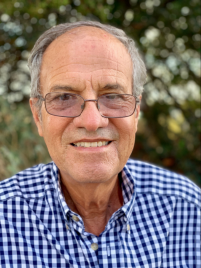
Carlos F. Quiros
Professor of Plant Sciences, Emeritus
Carlos F. Quiros, a professor emeritus in the Department of Plant Sciences at the University of California, Davis (UC Davis), passed away on February 3, 2025, at the age of 78. Born on March 17, 1946, in Lima, Peru, Quiros dedicated his professional life to advancing the genetics, genomics and breeding of cool-season vegetable crops.
Quiros earned his B.S. in 1968 from the Universidad Nacional Agrária La Molina in Peru, his M.S. in 1972 from the University of New Hampshire, and his Ph.D. in Genetics from UC Davis in 1975. His mentor and role model at La Molina was Miguel Holle, a plant collector and horticulturalist who was an authority on the wild tomatoes of Peru with whom Quiros did field work as a student. His doctoral thesis, “Cytogenetic Consequences of Extra Heterochromatin in the Tomato Genome”, examined the effects on plant vigor and fertility of extra copies of a short, rearranged chromosome composed mostly of repetitive (“junk”) DNA. He studied under the late Prof. Charles M. Rick in the Vegetable Crops Department, a renowned plant geneticist who developed the field of tomato cytogenetics and assembled the world’s largest collection of tomato wild relatives, mutants and other genetic stocks at Davis.
Quiros held several post-doctoral positions, gaining experience in different systems, including: tomato breeding at the Instituto Nacional de Investigaciones Agrícolas in Celaya, Mexico; the cytogenetics of Chinese hamsters at the University of Sherbrooke in Quebec, Canada; genetics and breeding of alfalfa at the University of Alberta, Edmonton, Canada; and commercial sector research at the International Plant Research Institute in San Francisco, California. He joined the UC Davis faculty in 1983 as an Assistant Professor in the Vegetable Crops Department, where he worked until retiring in 2011.
Quiros’ research encompassed plant breeding, genetics, cytogenetics and genome evolution. Much of his work focused on understanding genome evolution within the Brassicaceae family, particularly Brassica oleraceae (cabbage, broccoli, kale, and others), B. rapa (turnip, bok choi, etc.), and B. napus (oilseed rape). He showed that the differences in chromosome numbers among these groups were accompanied by duplications and rearrangements of large blocks of DNA. His group studied the genetic control of differences in the levels of glucosinolates, a class of beneficial phytonutrients found in Brassica species. They used the first whole genome sequence of the model plant Arabidopsis, a related Brassicaceae species, to analyze differences in gene content and gene order around glucosinolate-related genes. His group also made important contributions to celery (Apium graveolens) improvement, releasing the first Fusarium-resistant breeding line, ‘UC1’, which incorporated resistance from celeriac (celery root), and later released several improved selections that were used by the seed industry to breed commercial cultivars for production in California. He also bred a potato cultivar ‘Inka Gold’, known for its buttery flavor and purplish skin.
In addition to the major North American vegetable crops, Quiros also advanced scientific knowledge of the Andean root and tuber crops maca (Lepidium meyenii) and mashua (Tropaeolum tuberosum), which are grown for their nutritional value and/or abiotic stress tolerance. His research on Andean crops included accompanying Charley Rick on his last collecting trip to find wild tomatoes, during unsettled times in Peru when the Shining Path guerilla movement was active. Other Andean projects with Peruvian colleagues examined the distribution of potato diversity in farmers’ fields and a multidisciplinary team effort with colleagues from UC Davis and the Universidad Nacional San Antonio Abad de Cusco aimed at controlling insect predation on minor Andean tuber crops.
Quiros trained many postdocs and graduate students who went on to careers in plant breeding/genetics in academia or the private sector. He was known as an exceptionally friendly and caring teacher and mentor. He developed and taught for many years a graduate course on Vegetable Genetics and Breeding. He also taught a student seminar course on the History of Genetics which included lively commentary and anecdotes provided by Mel Green, a pioneer in fruit fly genetics and a contemporary of many of the key scientists who made groundbreaking discoveries in the field of genetics over the latter half of the 20th century. Quiros also served as an advisor to the Genetics Graduate Group and contributed to developing the doctoral program within the Horticulture and Agronomy Graduate Group. He is remembered for his wry sense of humor, evidenced by a photo posted beside his office door showing a happy face arrangement of a chromosomes during meiosis.
He is survived by his wife, their two children, and four grandchildren.
The University of California and California agriculture has lost an exceptional scientist, teacher and mentor, and an authority on diverse vegetable crops who developed new varieties and breeding germplasm that benefited vegetable production in California while analyzing their genomes for useful traits and the genes that underlie them.
Roger T. Chetelat
Stephen B. Brush
Kent J. Bradford
